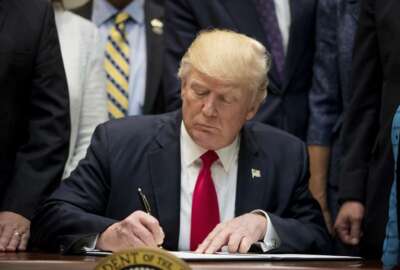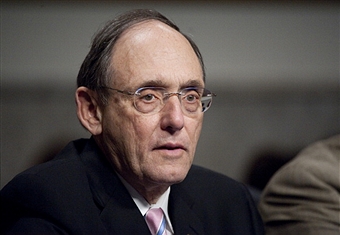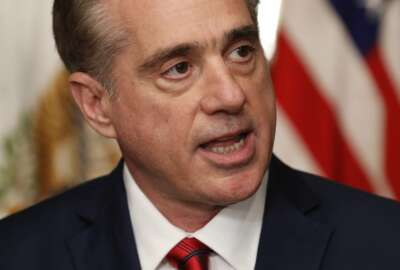
Senate accountability bill eliminates MSPB appeal rights for VA senior executives
Members of the Senate have reached a long awaited agreement on new accountability procedures for senior executives and employees within the Veterans Affairs...
A group of senators say they’ve reached a long-awaited agreement on legislation that would give the Veterans Affairs Department new firing and disciplinary procedures for senior executives and the rank-and-file.
The solution, they say, comes in the form of the Veterans Affairs Accountability and Whistleblower Protection Act, which senators introduced with some bipartisan fanfare Thursday.
Its release comes days after the U.S. Court of Appeals ruled unconstitutional a controversial firing and appeals provision in Congress’ original attempt at accountability legislation.
Pieces of the Accountability and Whistleblower Protection Act will look familiar, but the legislation’s sponsors, Senate Veterans Affairs Committee Chairman Johnny Isakson (R-Ga.), Ranking Member Jon Tester (D-Mont.) and Sen. Marco Rubio (R-Fla.), say they’ve found the right combination of provisions that will satisfy strong proponents of faster firing procedures and those previously concerned about weakening federal employee due process rights.
Sens. John McCain (R-Ariz.), Jerry Moran (R-Kan.), Tammy Baldwin (D-Wis.), Bill Nelson (D-Fla.) and Jeanne Shaheen (D-N.H.) are co-sponsors of the bill.
The new Senate bill included many of the provisions the House wrote in its version, the VA Accountability First Act, which cleared the chamber in March.
But the Senate legislation is different in several ways.
The bill gives the VA secretary a 15-day notice, response and decision period to remove, demote or suspend senior executives for misconduct or poor performance.
The grievance process can take no longer than 21 days, and the senior executive’s peers would review their case. Senior executives can appeal to the courts but no longer the Merit Systems Protection Board.
The VA secretary can also remove, demote or suspend employees under a similar, expedited timeline.
VA employees can appeal to an administrative judge at MSPB, who would have 180 days to issue a decision. Employees can appeal the judge’s decision to the full board.
The department cannot place an employee suspended for more than 14 days on administrative leave, consistent with the new policy Congress included in the 2017 National Defense Authorization Act.
At 52 pages, the Senate’s new bill also codifies the new Office of Accountability and Whistleblower Protection, which President Donald Trump created in a recent executive order. It also has more details about the office’s function and provides more clarity on whistleblower protection activities.
Specifically, the bill gives the new accountability office more independence and charges the assistant secretary who leads it to maintain a toll-free hotline and website to receive anonymous whistleblower disclosures.
Ensuring whistleblower protections will get embedded in VA supervisors’ performance plans, the bill said. The Assistant Secretary of Accountability and Whistleblower Protection will also report to the VA secretary and Congress on the methods the office uses to investigate the department’s employees and whether those approaches are used to retaliate against whistleblowers.
Previous attempts at accountability legislation have largely failed in the Senate, including Isakson’s own Veterans First Act, which received broad support in the committee but ultimately never made it to the Senate floor for a vote.
But this bill has support from Democrats, leadership on the House Veterans Affairs Committee and VA Secretary David Shulkin, who said Thursday morning during the Senate appropriations hearing that he supported the legislation.
“I want people to understand, I am not seeking this and I do not support your legislation so that we can willy-nilly fire employees or allow supervisors to abuse our employees,” Shulkin said. “This allows due process. I believe it’s very important that our employees have due process, the right to pre-decisional appeals, the right to be represented by the union or their attorneys, but in the cases, that frankly we need to make the changes in management or other changes, today I just don’t have that ability to do it.”
Tester said the bill protects hardworking VA employees while holding bad actors accountable, adding that the legislation is a product of bipartisan, apolitical conversations.
The ranking member of the House VA Committee also appeared supportive.
“We applaud our colleagues in the Senate for their bipartisan efforts to give the VA Secretary the tools they need to hold bad employees accountable for doing so in a way that maintains constitutionally mandated workplace protections that help shield good employees and whistleblowers from retaliation,” Rep. Tim Walz (D-Minn.) said in a statement.
But not all opponents of Congress’ previous attempts at VA accountability legislation are in support of this new bill.
“We agree that employees who fail to serve our veterans with the dignity and respect they deserve should be fired, but not when it means ruining the careers and lives of other employees,” American Federation of Government Employees National President J. David Cox said in a statement. “Many of the employees who blew the whistle on wait lists and other abuses at the VA faced retaliation for coming forward, but they were protected by civil service rights and their union contract. This legislation would eliminate the only true protections they have.”
The Senate VA Committee will consider the bill at a hearing next Wednesday.
Copyright © 2025 Federal News Network. All rights reserved. This website is not intended for users located within the European Economic Area.
Nicole Ogrysko is a reporter for Federal News Network focusing on the federal workforce and federal pay and benefits.
Follow @nogryskoWFED
Related Stories






